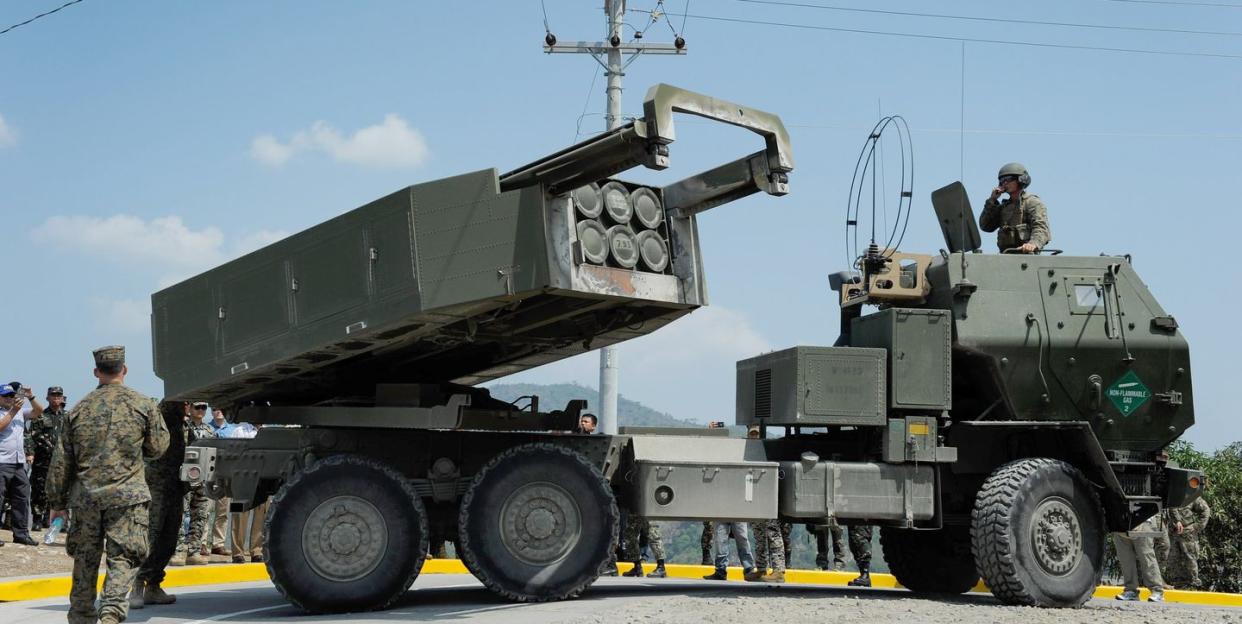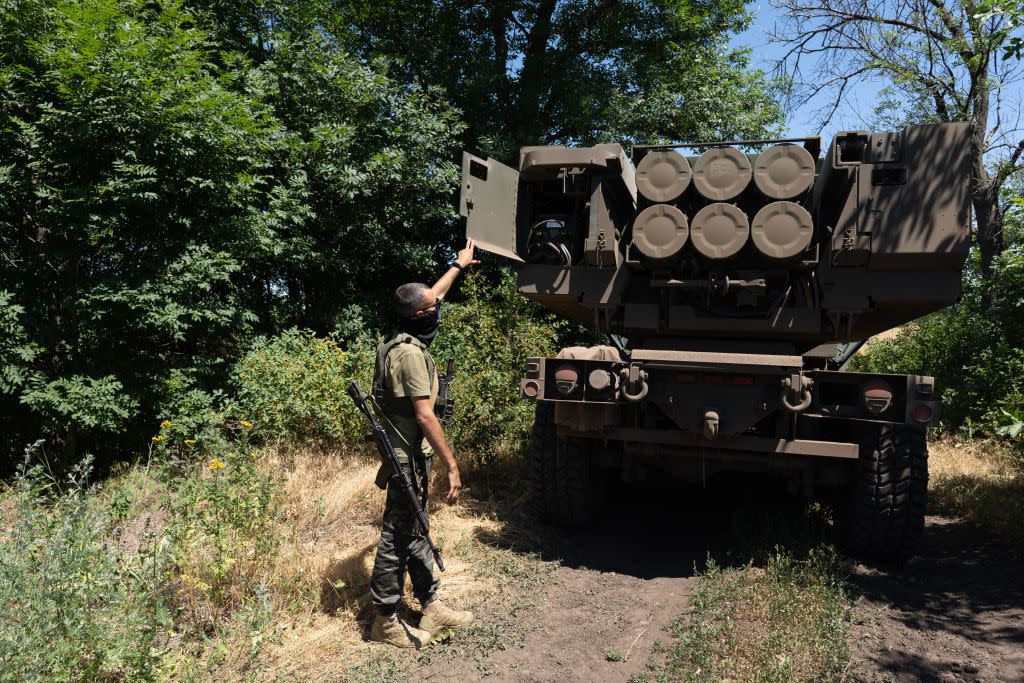Russia Claims It ‘Hacked’ HIMARS Rocket Launchers. That’s Probably a Big, Fat Lie

A Russian military expert on state television has declared Russia has already “hacked” the HIMARS rocket-launcher system.
The hack allegedly allows Russia to “pinpoint” the launch site.
It is extremely unlikely that this claim has any basis in fact.
A bizarre claim that the Russian military could hack into and precisely locate HIMARS rocket launchers has failed the test of time. The claim, which a defense pundit made in late July on Russian national television, was supposedly an “unpleasant surprise” for the Americans supplying the weapon to Ukraine. Nearly a month later, there is zero evidence any HIMARS trucks have been lost.
✈︎ Don’t miss any of our best-in-class military and defense news. Join our squad with Pop Mech Pro.
Alexei Leonov, editor of the Russian military magazine Arsenal Otechestva (“Arsenal of the Fatherland”), made the allegation on the Rossiya-1 TV channel, as Newsweek first reported. Leonov appeared as a guest of TV host Vladimir Solovyov, whom Newsweek duly points out is designated by the State Department as a Kremlin propagandist.

“The American system has been hacked,” Leonov announced to his television audience, “and our secret development will be deployed in all directions. A good system, I can’t name it yet, but it works at much greater distances, instantly fixing the launch site. For the Americans, this was a very unpleasant surprise.”
How Is Ukraine Using HIMARS?
Ukraine currently operates 16 M142 High Mobility Artillery Rocket Systems, or HIMARS, donated by the United States. HIMARS consists of a medium-sized tactical truck that can carry up to six 227-millimeter GPS-guided rockets and launch them a distance in excess of 43 miles. Each rocket has a 200-pound, high-explosive warhead, and GPS guidance ensures each rocket can land within 16 feet of the designated aiming point.
The U.S. sent the first four HIMARS to Ukraine in early June, and by late July, Ukrainian forces had struck more than 100 “high-value” military targets. HIMARS systems have proven extraordinarily effective against Russian forces in Ukraine, devastating Russian command posts, ammunition dumps, and air-defense systems. HIMARS has accelerated the hollowing out of Russia’s military forces, compounding poor leadership and supply problems by destroying headquarters units and sources of resupply.

American officials are pleased with Ukraine’s use of HIMARS, steadily upping the number of rocket launchers sent to the country as Kyiv continues to strike targets behind Russian lines. Last week, a senior U.S. defense official noted that Ukraine has “masterfully” used HIMARS, and that the latest tranche of U.S. military aid, which included HIMARS ammunition, was to ensure Ukraine received “a steady stream of ammunition to meet its needs.”
Could Russia Really Hack HIMARS?
Back to the claims. To recap, Leonov said that Russia has “hacked” HIMARS, and that Russian forces can “instantly fix the launch site.” There are two possible explanations for this.
One is that Russian forces are using counter-battery radars to detect HIMARS launch locations. Counter-battery radars search the skies for enemy artillery rockets and shells in flight. Once a counter-battery radar detects incoming artillery projectiles, it can then extrapolate a likely launch location. This information is then passed on to friendly artillery that then bombard the location, ideally catching the enemy artillery before it moves to a new firing position.

Could Russian counter-battery radars help destroy HIMARS systems? Absolutely. Counter-battery radars like the Zoopark-1 can detect six 13-foot-long rockets soaring into Russian-held territory. HIMARS is a wily target, however: the M142’s truck chassis, the use of GPS to quickly lay in a HIMARS firing position, and Ukraine’s excellent network of paved roads mean that a HIMARS truck can quickly “shoot and scoot” before Russian artillery can rain down on its position.
Leonov’s use of the word “hack” implies Russian forces somehow penetrated the HIMARS system itself. This could be in reference to Russian hacking of the HIMARS communication system, navigation and targeting system, or the truck’s computer system. None of this is very likely, though: the American-made SINCGARS VHF communications system in use by Ukraine is difficult to detect, and Russian forces cannot “instantly” pinpoint the location of a single user. The navigation and targeting computers likely only receive data, broadcasting no detectable radio-frequency signal. HIMARS does use an internal computer system, but it is unlikely it broadcasts signals detectable by Russian forces at range. The likelihood Russian forces have hacked HIMARS is right around zero.
Leonov was almost certainly making stuff up to bolster Russian public opinion. This is not unprecedented in Russian state-controlled media: in 2014, Russian propagandists claimed that the guided-missile destroyer USS Donald Cook was disabled by an “electronic bomb” while in the Black Sea, one that could “deactivate the whole ship’s systems.” This is widely regarded to have been untrue, and the Donald Cook otherwise sailed through the Black Sea without incident. More recently, according to the New York Times, Russian propaganda has grown “increasingly outlandish” in an attempt to justify the invasion of Ukraine.

Alexei Leonov is no stranger to fantastic claims. In 2021, he asserted, without proof, that the Russian Su-57 fighter jet left its American rivals, the F-22 and F-35, “far behind” in terms of performance. Leonov also predicted that the upcoming Russian S-500 air defense system would fare well against the upcoming B-21 Raider stealth bomber, despite neither system being in service with either country. In early August, he declared the U.S. had started to back off its support of the Ukrainian government, the same day Washington announced a new $1 billion military aid package. Another $775 million military aid package was announced on August 19.
Russian propaganda claims the Russian military has destroyed four HIMARS launchers, yet it has produced no credible evidence to back it up. HIMARS is undoubtedly a real thorn in Russia’s side and will be a priority for destruction in the weeks and months to come. While it’s quite possible the Russian military will get lucky and destroy one of the elusive weapon systems, Moscow has no sure-fire fix for the problem—except to get out of Ukraine.
You Might Also Like
